As real-life mountain climber Aron Ralston, James Franco is a carefree daredevil who’s gotten himself in a tight spot in the new trailer for Danny Boyle’s 127 Hours. Um…ok. Striking cinematography as usual, but, in turning this disarming tale into a full-length movie, it’s hard to see how Boyle will improve on a film like Touching the Void.
Tag: Danny Boyle
Little Miss Slumdog.
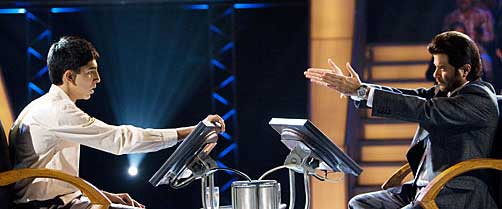
Partly a Dickensian travelogue through the horrors of Mumbai slum life, partly a generous heaping of third-world-despair pr0n leavened with a very first-world cherry on top (A game show can change your life!), Slumdog Millionaire is in essence a feel-good, less resonant version of Fernando Meirelles’ City of God. If you can remain relatively ambivalent about cartoonish, over-the-top villains, characters who make random decisions solely to further the plot, a lot of chase scenes set to (admittedly catchy) bhangra, and, of course, a thoroughly implausible saccharine-sweet ending, Slumdog Millionaire may be more up your Mumbai back-alley than it was mine. For everyone else, do not pass go, do not collect $200. Make no mistake: As cloying as Little Miss Sunshine at times, this is really the Crash of this year’s Oscar crop (and, very possibly, the worst million-related Best Picture winner since Million Dollar Baby in 2004.)
Slumdog Millionaire begins, improbably enough, with a torture scene. Having gotten within one question of the big payday in India’s version of Who Wants to Be a Millionaire?, our hero Jamal (Dev Patel, an appealing presence) has been strung up at the local police precinct in Mumbai and hooked to a rusty car battery. His crime? Why, cheating, of course — there’s no way an itinerant slum kid and chaiwalla (tea carrier) could’ve known all the answers…could he? Since Jamal won’t break under the juice, the local sergeant (Irrfan Khan, the most recognizable actor in the film for western audiences) gives him a chance to recount his story. And what a story it is, involving religious riots and narrow escapes and rape and child mutilation and brotherly betrayal and swimming through a river of feces…uh, did I mention this was a feel-good movie?
As it turns out, the torture scene that starts the film is both a feint and a taste of things to come. It’s a feint because, however grisly the opening, Slumdog ultimately plays out in a very different world than it originally suggests, one where bad guys invariably get their comeuppance, love conquers all, and the truth really does set you free. People have been using the “Dickensian” label to compliment this film as a social novel of the city of Mumbai, but, to be honest, it works both ways. The villains of the piece, gangsters and orphan-nabbers and such, are cartoonish enough to make Fagin and Bill Sykes blush. Like any number of Dickens’ supporting casts, most of the characters are paper-thin and plot-determined (I’m thinking particularly of Jamal’s brother, who waxes on and off from scene to scene depending on what the story requires of him.) And the movie takes some ridiculous jags throughout — the last few scenes, for example — that reminded me of nothing more than ole Pip’s jailbird benefactor in Great Expectations. Yeah, it’s Dickensian alright, and not in a good way.
In any event, that kick-off torture scene works as foreshadowing too, as it turns out that Jamal has learned the answer to every single question (in order, to boot) as a side benefit of experiencing something truly nightmarish in his life. What is the name of Lucy Van Pelt’s younger brother? Why, I dressed up as Linus on that same Halloween the house burned down. Who’s the 27th president of the United States? That’s funny, a guy with a William Howard Taft t-shirt shot my dog. Even notwithstanding the screwed up moral economy of this notion — don’t fret if god-awful things happen to you, you might just win some money from it some day! — and the weird voyeurism involved in this story — oof, third world poverty is grotesque and horrifying, isn’t it? But don’t worry, we give the kid a happy ending! — it all gets to be a bit ridiculous over time. I mean, thank god Jamal didn’t get any questions about astronomy, or the poor kid might’ve gotten walloped by a meteor.
Are there things I enjoyed about Slumdog? Well, yes. Like all of Danny Boyle’s films (Trainspotting, The Beach, Sunshine) it’s sleek and propulsive and well-made. As I said above, Patel, Khan (a.k.a. India’s own Chiwetel Ejiofor), and a few others are engaging here. And I particularly liked the scene where Jamal gets fed an answer by the show’s host (Anil Kapoor)…sort of. But, as for the rest of it, I found myself looking at my watch more often than not. For those of you who’ve seen the film, I think Slumdog Millionaire could’ve at least “stuck the landing” for me if, in the final scene, [highlight to read] Latika had answered the phone, told him she was safe, she loved him, etc. etc., and then they both happily blew off the final question. So Jamal didn’t get the money, but he got the girl, and wasn’t that what he was in it for anyway? But, as it ends here — have your cake and eat it too, Jamal — it just reminded me once again how stilted, manipulative, and implausible this movie turned out to be. And by the time an impromptu Bollywood number broke out with the credits, I had my very own bhangra-scored running scene…out the door.
The Curious Case of Benjamin’s Oscar Love.
The powers-that-be announce the nominees for the 81st Academy Awards, with The Curious Case of Benjamin Button garnering 13 nominations (it helps when your Oscar Bait is FX-heavy), Slumdog Millionaire grabbing ten, and Milk and The Dark Knight notching eight apiece. (That being said, TDK was frozen out of the main awards, Ledger’s inevitable Supporting Actor bid notwithtanding.)
Also in the running for major stuff: The Reader (picture, actress, director), The Wrestler (actor, supporting actress), Doubt (actor, screenplay, actress, supporting actress), Frost/Nixon (director, actor, screenplay), and WALL-E (screenplay, animated film). And the happy semi-surprises: Richard Jenkins for The Visitor and Robert Downey, Jr. for Tropic Thunder.
I’ll make my picks with the GitM 2008 list, which should be coming up within the next week or two. (The movies I’ve been waiting for — Frost/Nixon, Revolutionary Road, and The Wrestler — all open here tomorrow.) And, don’t worry, 2009 isn’t being slighted all that much: I highly doubt Paul Blart: Mall Cop was going to make the cut anyway.
Good Germans | Poor Little Rich Boy | Rusty Fan.
In the trailer bin of late:
2007 in Film.
Happy New Year, everyone. So unlike last year, when I took an extra month on account of my travels in New Zealand, the Best of 2007 Movie list seems ready to go out on schedule, and it’s below. (If you’ve been reading all the reviews around here, I’m betting the top few choices won’t be a surprise. Still, organizing the 5-15 section was more tough than usual this year.) At any rate, 2008 should be a big orbit around the sun in any event, what with grad school winding down and it being time — at last! — to pick a new president. So a very happy new year to you and yours, and let’s hope the movies of the coming year will contain to sustain, amuse, baffle, and delight.
[2000/2001/2002/2003/2004/2005/2006]


2. No Country for Old Men: It probably won’t do wonders for West Texas tourism. Still, the Coens’ expertly-crafted No Country works as both a visceral exercise in dread and a sobering philosophical rumination on mortality and the nature of evil. (And in his chilling portrayal of Anton Chigurh, Javier Bardem has crafted a movie villain for the ages.) People sometimes refer to Coen movies as “well-made” as a dig, as if the brothers were just soulless clinically-minded technicians. I couldn’t disagree with that assessment more. Still, No Country for Old Men seems so seamless and fully formed, so judicious and economical in its storytelling, that it reminds me of Salieri’s line in Amadeus: “Displace one note and there would be diminishment, displace one phrase and the structure would fall.” A dark journey that throbs with a jagged pulse, No Country for Old Men is very close to the best film of the year, and — along with Miller’s Crossing, Fargo, and The Big Lebowski — yet another masterpiece sprung from the Coens’ elegant and twisted hive-mind. Bring on Burn After Reading.

3. The Diving Bell and the Butterfly: Through the wonders of cinematic alchemy, Julian Schnabel took the sad real-life account of Vogue editor Jean-Do Bauby’s horrific imprisonment within his own body and made it soar. No other film this year put the “locked-in” experience of taking in a movie as inventively in service of its story (although I kinda wish Atonement had tried.) Special kudos to Mathieu Almaric for conveying so much with so little to work with, and to Max von Sydow for his haunting turn as Bauby’s invalid father. And, lest someone holds “arthouse foreign film” against it, Diving Bell is both much funnier and more uplifting than anyone might expect of a tale about hospital paralysis. Salut.
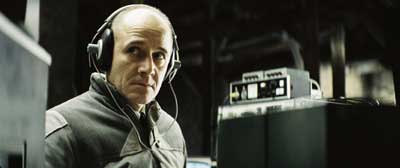
[3.] The Lives of Others: The one hold-over from 2006 on the list this year (I was pretty thorough about catching up before posting last January, although I still never did see Inland Empire), The Lives of Others is a timely and compelling parable of art, politics, surveillance, and moral awakening in the final days of the Stasi. In a way, Lives is an East German counterpart to Charlie Wilson’s War, a story about how even small political acts of individual conscience can change the world, even (or perhaps especially) in a decaying Orwellian state. With a memorable central performance by Ulrich Muhe and a languid conclusion that ends on exactly the right note, the resoundingly humanist Lives of Others is a Sonata for a Good Man in Bad Times. We could use more of its ilk.

4. Knocked Up: Judd Apatow’s sweet, good-natured take on modern love and unwanted pregnancy was probably the most purely satisfying film of the summer. As funny in its pop-culture jawing as it was well-observed in its understanding of relationship politics, Knocked Up also felt — unlike the well-meaning but overstylized Juno, the film it’ll most likely be paired with from now herein — refreshingly real. As I said in my recent review of Walk Hard, an eventual Apatow backlash seems almost inevitable given how many comedies he has on the 2008 slate. Nevertheless, we’ll always have Freaks & Geeks, and we’ll always have Knocked Up.

5. The Bourne Ultimatum: The third installment of the Bourne franchise was the best blockbuster of the year, and proved that director Paul Greengrass can churn out excellent, heart-pounding fare even when he’s basically repeating himself. Really, given how much of Ultimatum plays exactly like its two predecessors on the page — the car chase, the Company Men, the Eurotrash assassin, Julia Stiles, exotic locales and cellphone hijinx — it’s hard to fathom how good it turned out to be. But Bourne was riveting through and through…You just couldn’t take your eyes off it. I know I’ve said this several times now, but if Zack Snyder screws up Watchmen (and I’d say the odds are 50-50 at this point), the lost opportunity for a Greengrass version will rankle for years.

6. Zodiac: The best film of the spring. What at first looked to be another stylish David Fincher serial killer flick is instead a moody and haunting police procedural about the search for a seemingly unknowable truth, and the toll it exacts on the men — cops, journalists, citizens — who undertake it for years and even decades. Reveling in the daily investigatory minutiae that also comprise much of The Wire and Law and Order, and arguably boasting the best ensemble cast of the year, Zodiac is a troubling and open-ended inquiry that, until perhaps the final few moments, offers little in the way of satisfying closure for its characters or its audience. Whatever Dirty Harry may suggest to the contrary, the Zodiac remains elusive.

7. 28 Weeks Later: Sir, we appear to have lost control of the Green Zone…Shall I send in the air support? Zombie flicks have been a choice staple for political allegory since the early days of Romero, but one of the strengths of Juan Carlos Fresnadillo’s merciless 28 Weeks Later — perhaps the best horror sequel since James Cameron’s Aliens — is that it foregoes the 1:1 sermonizing about failed reconstructions and American hubris whenever it gets in the way of the nightmare scenario at hand. (Besides, if you wanted to see explicit muckraking about current events this year, there were options aplenty, from In the Valley of Elah to No End in Sight, although plenty of this year’s politically-minded forays — Rendition, Lions for Lambs — looked rather inert from a distance.) There’s little time for moralizing in the dark, wretched heart of 28 Weeks Later: In fact, the right thing to do is often suicide, or worse. You pretty much have only one viable option: run like hell.

8. In the Valley of Elah: Paul Haggis’ surprisingly unsentimentalized depiction of the hidden costs of war for the homefront, Elah benefits greatly from Tommy Lee Jones’ slow burn as a military father who’s lost his last son to a horrific murder. In fact, it’s hard not to think of Jones’ inspired performances here and in No Country of a piece. There was something quintessentially America-in-2007 about Jones this year. In every crease and furrow of this grizzled Texan’s visage, we can see the wounds and weariness of recent times, the mask of dignity and good humor beginning to slip in the face of tragic events and colossal stupidity. Jones is masterful in Elah, and while Daniel Day-Lewis seems to be garnering most of the accolades for There Will Be Blood and Philip Seymour Hoffman stunned in three pics this fall (all on the list below), I’d put Jones’ work here as the best of the year.

9. There Will Be Blood: Ah, the maddening There Will Be Blood. I just reviewed this one yesterday, so it’s doubtful my opinion on it has changed much. But what Anderson’s film reminds me of most at the moment (and not only for the Daniel Day-Lewis connection) is Scorsese’s Gangs of New York, a movie I reviewed at the end of 2002 and then bumped up a few spots a week later when writing the 2002 list, thinking that its flaws would diminish over time. They haven’t — if anything, they’re just as noticeable as ever. So it may well be with TWBB. Even despite its somewhat unseemly pretensions to greatness, the first hour or so of There Will Be Blood, from the Kubrickian opening to the Days in Heaven-ish burning oil rig, is as powerful and memorable as you could ever want in a film. But TWBB loses its way, and the second half is a significantly less interesting enterprise, ultimately culminating in that goofy, illogical bowling alley ending. I’d characterize Blood as a significant step forward for PTA, and there’s something to be said for getting even this close to a masterpiece. But he hasn’t struck black gold yet.

10. Hot Fuzz: While I personally still prefer Shaun of the Dead, this fish-out-of-water, buddy-cop action spectacle proved the droll British team of Nick Frost, Simon Pegg, and Edgar Wright can’t be considered one-hit-wonders (and that they’re as savvy about certain pop culture tropes as their American colleagues in the Apatow camp.) And, while I didn’t see Elizabeth II: The Golden Age, Hot Fuzz may well include the second-best Cate Blanchett performance of the year.
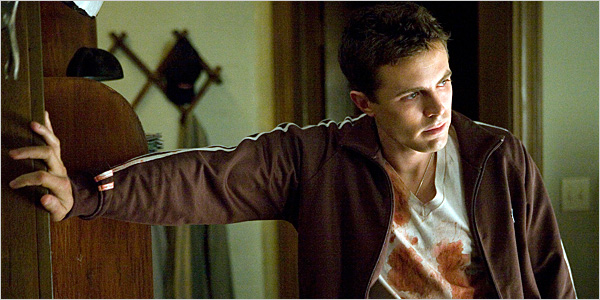
11. Gone Baby Gone: First-time director Ben Affleck acquits himself well with this chronicle of missing children and seedy n’er-do-wells in working-class Boston, wisely choosing to stick with a town and a leading man he knows like the back of his hand. His brother Casey holds his own, and crime author Dennis Lehane’s original source material provides some compelling twists-and-turns throughout. And, as the drug-addled, quick-to-dis Townie mom who’s lost her baby, The Wire‘s Amy Ryan gives arguably the Best Supporting Actress performance of the year (although she’ll likely get some run from Blanchett’s Jude Quinn.)

12. Michael Clayton: Clooney’s impeccable taste in projects continues with this, Tony Gilroy’s meditation on corporate malfeasance and lawyerly ethics (or lack thereof.) The bit with the horses still seems a convenient (and corny) happenstance on which to hang such a major plot point, and I found Tilda Swinton to be overly mannered and distracting for much of the film’s run. But most else about Michael Clayton, from Sidney Pollack’s Master of the Universe to Michael O’Keefe’s snide, unctuous #2 to Tom Wilkinson’s last scene to Clooney not rebounding as well to events as, say, Danny Ocean, rang true. A small film, in its way, but a worthwhile one.
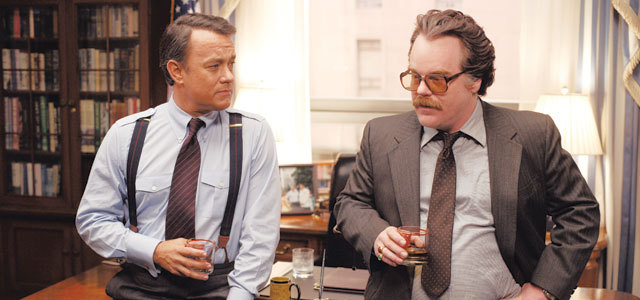
13. Charlie Wilson’s War: Another one I wrote on in the past 24 hours, so I don’t have much to add. Perhaps the best thing about Mike Nichols and Aaron Sorkin’s adaptation of Crile’s book is that it “gets” politics like few recent Washington thrillers I can think of. Philip Seymour Hoffman shows impeccable comic timing as the gruff Gust Avrakotos, and he works very well with Hanks here, who’s gone from being overexposed a few years ago back to a guy I wouldn’t mind seeing more of, particularly if he continues along the Alec Baldwinish character actor path Wilson sometimes suggests could be his future.
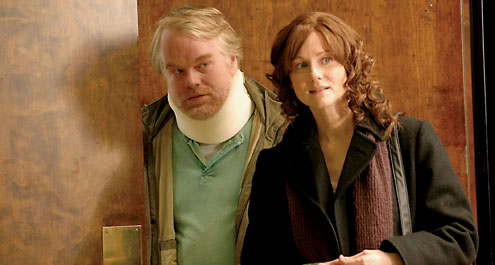
14. The Savages: I actually thought about putting Tamara Jenkins’ The Savages higher on this list, and few other movie endings this year hit me in the gut quite like this one. But, there are definite problems here, such as the wheezy Gbenga Akinnagbe subplot, which compel me to keep it here in the mid-teens. Still, this comedy about an ornery lion in winter, and the battling cubs who have to come to his aid, is a worthwhile one, and particularly if you’re in the mood for some rather black humor. As Lenny the senescent and slipping paterfamilias, Philip Bosco gives a standout performance, as does Hoffman as the miserable Bertholdt Brecht scholar trapped in deepest, darkest Buffalo.
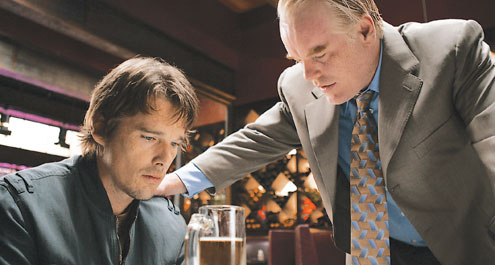
15. Before the Devil Knows You’re Dead: Now, Before the Devil is a movie I did end up seeing twice, on account of Brooklyn friends who were looking to catch it, and the film didn’t bring much new to the table on that second viewing. Still, Sidney Lumet and Kelly Masterson’s lean family tragedy benefits from several excellent performances — most notably by Hoffman, Ethan Hawke, Marisa Tomei, and Albert Finney, but also in supporting work by Amy Ryan, Michael Shannon, Brian O’Byrne, and Rosemary Harris — as well as a memorable Carter Burwell score. (Also, it’s just a coincidence that the three Hoffman movies ended up in a row like this — Still, it’s a testament to the man’s ability that he seemed unique and fully formed in each. Then again, the only time I can think of that Hoffman was actually bad in a film was Cold Mountain, which was pretty glitched up regardless.)

16. Sunshine: Along with There Will Be Blood, Danny Boyle and Alex Garland’s exasperating Sunshine is the other film this year that saw an amazing first hour become undone by breathtakingly poor choices on the back end. Unlike the halting, confused slide of TWBB, though, the moment where Sunshine slips the rails is clear-cut and irrefutable: It’s when what had been a heady science fiction tale about a near-impossible mission to the heart of the sun became instead an unwieldy space-slasher flick, i.e. basically an Armageddon variation on Jason X. The wreckage this subplot makes of what had been a superior hard-sci-fi film is more than a little depressing…Still, for that first hour, Sunshine is really something, perhaps the best realistically-portrayed outer space voyage we’ve seen on-screen in years.
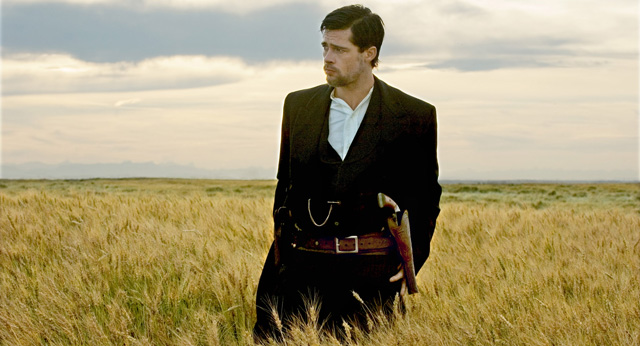
17. The Assassination of Jesse James by the Coward Robert Ford: Andrew Dominik’s sprawling psychological western about the end of the West and the early days of American celebrity-worship is every bit as ambitious and flawed as PTA’s There Will Be Blood. Still, maybe it’s the often stunning Roger Deakins cinematography, or the lively character actors (Sam Rockwell, Jeremy Renner, Garret Dillahunt) in the margins of the film, or maybe it’s even the terrible omniscient voiceover, which is every bit as distracting as the similarly ham-handed one in Little Children, and so goofy at times it verges on endearing. Whatever it is, I warmed to Jesse James more than I probably should, and for whatever reason I feel more willing to forgive it its considerable problems. If you blinked, you probably missed its theatrical run…but maybe it’ll find new life on DVD, when the 160-min running time won’t seem so off-putting.
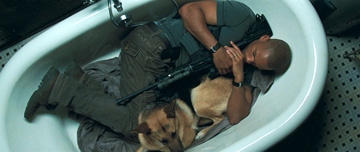
18. I am Legend: When the film focused on Will Smith and his dog fighting blood-sucking and badly rendered CGI Infecteds (whose level of social deevolution changed back and forth solely to accommodate turns in the plot), Francis Lawrence’s I am Legend could seem pedestrian and forgettable. But, when the movie focused on Will Smith and his dog fighting interminable loneliness in an eerily abandoned New York City, which was most of the first two-thirds of the film, I am Legend was a surprisingly melancholy and resonant blockbuster. What can I say? This one hit me where, and how, I live.
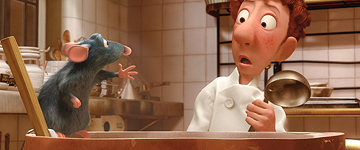
19. Ratatouille: There’s no review of this one up — I actually only saw it on DVD last week. And yet, while Ratatouille is a visual marvel (and Brad Bird and the PIXAR gurus don’t seem to make bad films), I found this nowhere near as inventive or entertaining as their last collaboration, 2004’s The Incredibles. (I’d put this one at about the level of Cars.) Now, this may in part be due to the fact that I have much more interest in comic book conceits than the culinary arts. (I’d even go so far as to say that I find many foodies — particularly those who blather on endlessly about Parisian cuisine — kind of insufferable.) Still, even given my relative lack of interest in the subject matter, Ratatouille bugged me. If “anyone can cook,” as Chef Gustave proclaims, why is no one’s input ever important but the rat? If it’s bad to make money selling pre-cooked (and affordable) food to the teeming masses, as Ian Holm’s character tries to do, why is it any better to do what Remy does? (And why should we care then when he and Gustave Jr. move into a deluxe apartment in the sky? I thought this enterprise wasn’t about making money.) In short, I thought Ratatouille wanted to have it both ways, cloaking a rather elitist, even snobbish story in the trappings of democratic tolerance. And the closing monologue by Peter O’Toole’s Anton Ego, which I thought ostensibly tried to make the movie critic-proof, irked me too. But, all that aside, it does look real purty.
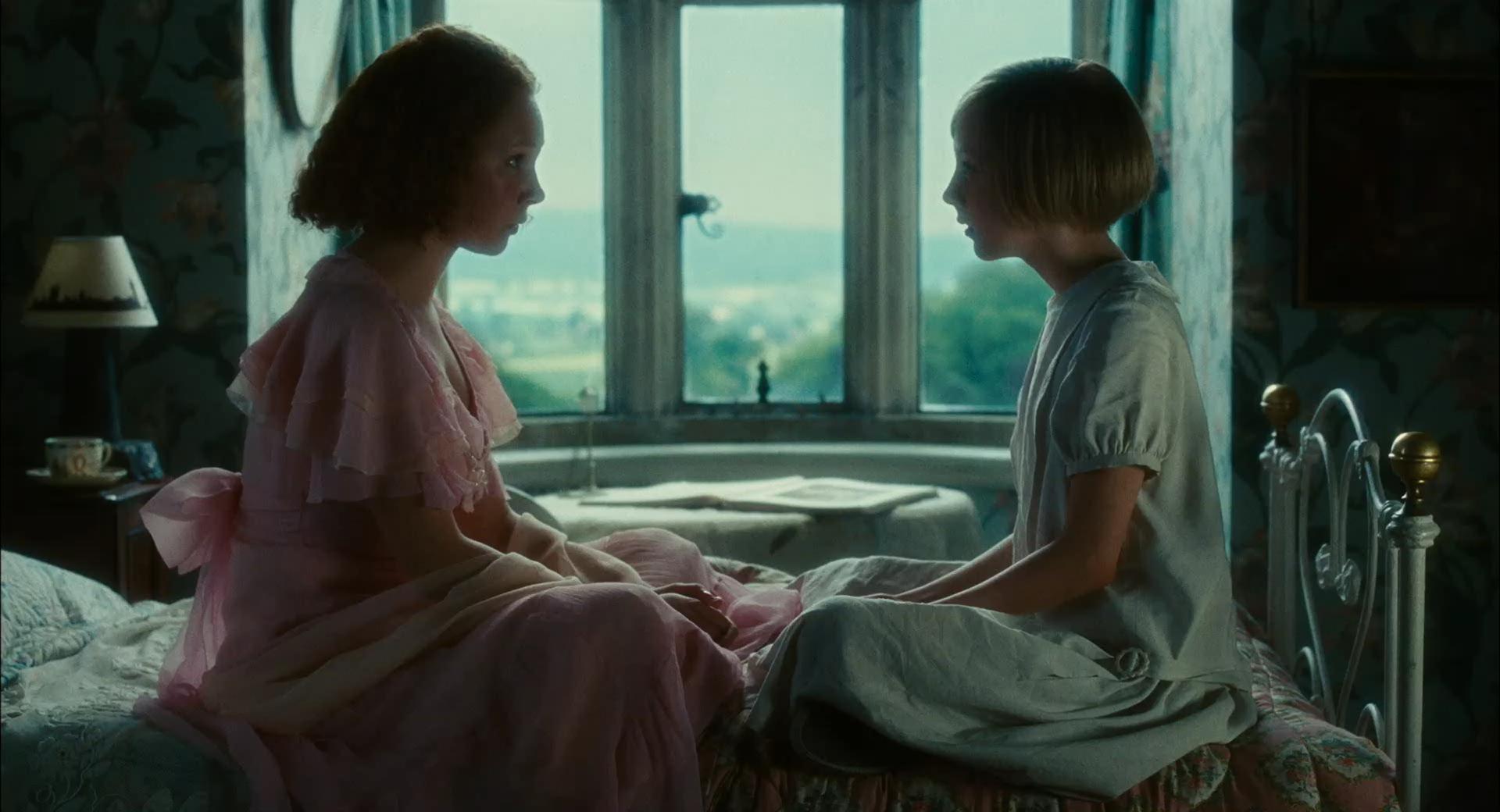
20. Atonement: There were several contenders for this last spot on this list, including Harry Potter and the Order of the Phoenix, The Simpsons Movie, and Jason Reitman’s Juno. But in the end I went with Joe Wright’s take on Ian McEwan’s novel, partly because people I trust who haven’t read the book beforehand haven’t shared my issues with the film. If nothing else, Atonement looks ravishing, and it features breakout performances by James McAvoy, Romola Garai, and Saiorse Ronan. Still, in a year that saw No Country and Diving Bell, I wish Wright had been less conventional in its approach to the story, and found a way to do the gloomy, misanthropic ending of McEwan’s novel justice.
Most Disappointing: The Golden Compass, Grindhouse, Spiderman 3, Southland Tales
Worth a Rental: 3:10 to Yuma, Beowulf, Eastern Promises, Harry Potter and the Order of the Phoenix, Juno, Live Free or Die Hard, Lust, Caution, Ocean’s 13, The Simpsons Movie, Stardust, Superbad, Walk Hard: The Dewey Cox Story
Don’t Bother: 300, Across the Universe, American Gangster, The Darjeeling Limited, Interview, The Invasion, Margot at the Wedding, The Mist, Pirates of the Caribbean 3: At World’s End, Transformers, You Kill Me
Best Actor: Tommy Lee Jones, In the Valley of Elah; Daniel Day-Lewis, There Will Be Blood
Best Actress: Ellen Page, Juno
Best Supporting Actor: Javier Bardem, No Country for Old Men
Best Supporting Actress: Amy Ryan, Gone Baby Gone; Cate Blanchett, I’m Not There
- A Good Year For:
- Casey Affleck (Assassination of Jesse James, Gone Baby Gone)
- Judd Apatow (Knocked Up, Superbad, Walk Hard)
- Josh Brolin (American Gangster, Grindhouse, In the Valley of Elah, No Country)
- Michael Cera (Superbad, Juno)
- Garret Dillahunt (No Country for Old Men, Assassination of Jesse James)
- Full-Frontal Parity (Diving Bell, Eastern Promises, I’m Not There, Walk Hard)
- Philip Seymour Hoffman (Before the Devil, Charlie Wilson’s War, The Savages)
- Tommy Lee Jones (In the Valley of Elah, No Country for Old Men)
- Man’s Best Friend (I am Legend, The Savages)
- Pregnant Hipsters (Knocked Up, Juno)
- Seth Rogen (Knocked Up, Superbad)
- Amy Ryan (Before the Devil, Gone Baby Gone)
- Texans (No Country for Old Men, Charlie Wilson’s War)
- The Western (3:10 to Yuma, Assassination of Jesse James, No Country for Old Men, There Will Be Blood)
- A Bad Year For:
- The Beatles (Across the Universe, Walk Hard)
- Josh Brolin’s PETA standing (American Gangster, No Country for Old Men)
- Great Cities (28 Weeks Later, I am Legend)
- Kidman/Craig Pairings (The Invasion, The Golden Compass)
- The Male Derriere (Charlie Wilson’s War, Margot at the Wedding)
- Standard-Issue Music Biopics(I’m Not There, Walk Hard)
2008: Be Kind, Rewind, Cassandra’s Dream, Cloverfield, The Curious Case of Benjamin Button, The Day the Earth Stood Still, Funny Games, Harold and Kumar Escape from Guantanamo, Harry Potter and the Half-Blood Prince, Hellboy 2: The Golden Army, In Bruges, The Incredible Hulk, Indiana Jones and the Kingdom of the Crystal Skull, Iron Man, James Bond 22, Jumper, Leatherheads, My Blueberry Nights, The Chronicles of Narnia: Prince Caspian, Revolutionary Road, Run, Fat Boy Run, Speed Racer, Star Trek, Valkyrie, Wall-E, Wanted, The X-Files 2…let’s see, am I missing anything…?

Welcome, 2008. I’ll see y’all on the other side.
Set the Controls for the Heart of the Sun.
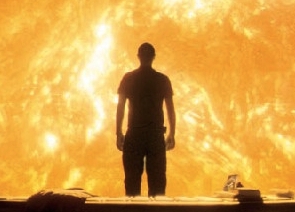 Sunshine, directed by Trainspotting‘s Danny Boyle and written by The Beach‘s Alex Garland, is an absolutely maddening film. Even more than their (and star Cillian Murphy)’s last collaboration, 28 Days Later, Sunshine ends up being a movie of two parts. The first hour and change of this flick is as intelligent and gripping a science fiction film as I’ve seen in years. Borrowing liberally from 2001, Alien, The Abyss, Solaris, and other sci-fi classics, it establishes both the terrifying sublimity and rickety U-boat-style claustrophobia of space travel from its opening moments. But, near the end, the movie takes a wildly wrong turn — you’ll know it when it happens — and Sunshine spins off uncontrollably and irrevocably into the yawning darkness of mediocrity. If you’re a genre fan at all, I have to recommend this movie just for its captivating, unsettling first eighty minutes or so — it’s really some of the best hard sci-fi I’ve seen in awhile. But, be advised — sadly, the mission gets compromised well before the end.
Sunshine, directed by Trainspotting‘s Danny Boyle and written by The Beach‘s Alex Garland, is an absolutely maddening film. Even more than their (and star Cillian Murphy)’s last collaboration, 28 Days Later, Sunshine ends up being a movie of two parts. The first hour and change of this flick is as intelligent and gripping a science fiction film as I’ve seen in years. Borrowing liberally from 2001, Alien, The Abyss, Solaris, and other sci-fi classics, it establishes both the terrifying sublimity and rickety U-boat-style claustrophobia of space travel from its opening moments. But, near the end, the movie takes a wildly wrong turn — you’ll know it when it happens — and Sunshine spins off uncontrollably and irrevocably into the yawning darkness of mediocrity. If you’re a genre fan at all, I have to recommend this movie just for its captivating, unsettling first eighty minutes or so — it’s really some of the best hard sci-fi I’ve seen in awhile. But, be advised — sadly, the mission gets compromised well before the end.
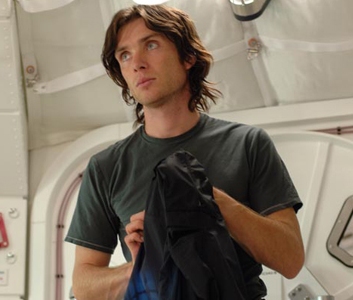 Very quickly in Sunshine, we’re given the set-up. Earth’s Sun is dying, an endless winter covers the lands, and the last, best hope of our planet rests on the shoulders of eight young astronauts, who are undertaking what amounts to a suicide mission: They will fly the solar-powered, bomb-carrying Icarus-2 to the Sun and reignite our star with a controlled nuclear blast. (The Icarus-1 tried seven years earlier and failed — apparently, nobody warned these people about the logical consequences of naming your ship thus.) These reluctant heroes include a number of likeable actors: Cillian Murphy (28 Days Later), Rose Byrne (padding out her genre cred again after 28 Weeks Later, and on whom I think I’m developing a crush), Chris Evans (the only good thing about FF, and very charismatic here), Michelle Yeoh (Crouching Tiger, always good), Benedict Wong (Dirty Pretty Things), Cliff Curtis (Live Free or Die Hard), Troy Garity (Steal this Movie), and Capt. Hiroyuki Sanada (Ringu, The Last Samurai) But, even early in the mission, some of these otherwise-amiable spacefarers are displaying Ash-like symptoms, and that’s even before the crew receive a long, lost distress signal from the Icarus-One. Tense meetings are held, important decisions are made, but faster than you can say the Mars Orbiter, human error has further complicated an already complicated situation, and soon the entire mission — and thus by extension the survival of Humanity — has been jeopardized…
Very quickly in Sunshine, we’re given the set-up. Earth’s Sun is dying, an endless winter covers the lands, and the last, best hope of our planet rests on the shoulders of eight young astronauts, who are undertaking what amounts to a suicide mission: They will fly the solar-powered, bomb-carrying Icarus-2 to the Sun and reignite our star with a controlled nuclear blast. (The Icarus-1 tried seven years earlier and failed — apparently, nobody warned these people about the logical consequences of naming your ship thus.) These reluctant heroes include a number of likeable actors: Cillian Murphy (28 Days Later), Rose Byrne (padding out her genre cred again after 28 Weeks Later, and on whom I think I’m developing a crush), Chris Evans (the only good thing about FF, and very charismatic here), Michelle Yeoh (Crouching Tiger, always good), Benedict Wong (Dirty Pretty Things), Cliff Curtis (Live Free or Die Hard), Troy Garity (Steal this Movie), and Capt. Hiroyuki Sanada (Ringu, The Last Samurai) But, even early in the mission, some of these otherwise-amiable spacefarers are displaying Ash-like symptoms, and that’s even before the crew receive a long, lost distress signal from the Icarus-One. Tense meetings are held, important decisions are made, but faster than you can say the Mars Orbiter, human error has further complicated an already complicated situation, and soon the entire mission — and thus by extension the survival of Humanity — has been jeopardized…
 This is all well and good. There are a few narrative quibbles one might make in the early going — Why, for example is Murphy the only person who knows how to work the payload? Seems like you might train a back-up — but, for the most part, everything holds together with some moderate suspension of disbelief. More importantly, the threats seem dire, the tension palpable, the vastness of space awe-inspiring and horrible, the machinery somehow alien and calculating, the odds of success tremendously unlikely. But, at a certain point in the story, just after the dwindling crew of Icarus-2 is forced to weigh the type of heady moral quandary that all good sci-fi is based on, a new threat to the mission emerges — which I won’t give away but which is eminently guessable — and it’s at this point Sunshine just leaps off the rails. The last half-hour of the movie is stylishly done, to be sure, and there are a few good flourishes (such as [spoiler] the final fate of Chris Evans’ character), but it’s assuredly not the movie we started with, nor is it the film Sunshine had been building to so tremendously to that point. (And this isn’t like me griping about the last ten minutes of Children of Men, which in retrospect and after repeated viewings seems uncharitable to an otherwise amazing science-fiction outing– this misstep really alters the mood, character, and ultimately the final experience of the film.) Again, if you enjoy science fiction, I’d give this movie a go regardless — its setup is that good. But, unfortunately, this Sunshine isn’t spotless by any means, and ultimately ends in eclipse.
This is all well and good. There are a few narrative quibbles one might make in the early going — Why, for example is Murphy the only person who knows how to work the payload? Seems like you might train a back-up — but, for the most part, everything holds together with some moderate suspension of disbelief. More importantly, the threats seem dire, the tension palpable, the vastness of space awe-inspiring and horrible, the machinery somehow alien and calculating, the odds of success tremendously unlikely. But, at a certain point in the story, just after the dwindling crew of Icarus-2 is forced to weigh the type of heady moral quandary that all good sci-fi is based on, a new threat to the mission emerges — which I won’t give away but which is eminently guessable — and it’s at this point Sunshine just leaps off the rails. The last half-hour of the movie is stylishly done, to be sure, and there are a few good flourishes (such as [spoiler] the final fate of Chris Evans’ character), but it’s assuredly not the movie we started with, nor is it the film Sunshine had been building to so tremendously to that point. (And this isn’t like me griping about the last ten minutes of Children of Men, which in retrospect and after repeated viewings seems uncharitable to an otherwise amazing science-fiction outing– this misstep really alters the mood, character, and ultimately the final experience of the film.) Again, if you enjoy science fiction, I’d give this movie a go regardless — its setup is that good. But, unfortunately, this Sunshine isn’t spotless by any means, and ultimately ends in eclipse.
Update: I’ve since discovered after taking a look at referrals that the film’s official site linked back to this review. Hey, thanks (particularly considering the review is mixed one. Mixed-positive…but mixed.)
Hitmen, and Solar Power.
Another slew of trailers: Tim Olyphant goes Wild Bill (to the strains of “Ave Maria”) in the teaser for Hitman (which I appropriately saw before Live Free or Die Hard yesterday — review on the way), Jason Bourne wants answers from Stiles, Allen, and Straitharn in the full trailer for Paul Greengrass’ The Bourne Ultimatum, and astronauts Cillian Murphy, Rose Byrne, Chris Evans, Michelle Yeoh and others attempt to reignite the sun in a spoileriffic “synopsis” trailer for Danny Boyle’s Sunshine (I’m linking to it ’cause it’s there, but if you have any interest in this flick, I probably wouldn’t watch it.)
Sunspotting.
The Gap into conflict? A slew of perky young astronauts, apparently unloaded off the Starship Banana Republic onto the aptly-named Icarus II, brave solar winds and treachery in the new trailer for Danny Boyle’s Sunshine, written by The Beach‘s Alex Garland and featuring Cillian Murphy, Rose Byrne, and Chris Evans. (See also the “Tower Requiem”‘ed-out UK trailer and international trailer at the official site.)
Tangos & Cash.
Two for the trailer bin: Meet the Fockers (hmmm…this looks like it might be a swing-and-a-miss), and Danny Boyle’s Millions (a.k.a. Trainspotting meets Pay it Forward…unfortunately, I doubt I’d pay money to see anything meets Pay it Forward.)
2003 in Film.
Well, it’s that time of year again, New Year’s Eve. So, without further ado…
[2000/2001/2002]
1. Lord of the Rings: Return of the King. If you didn’t see this pick coming, welcome to GitM. Ever since this blog started four years ago, I and it have been breathlessly awaiting Peter Jackson’s trilogy, and, boy, he delivered in spades. Even in spite of the pacing problems mandated by the TE running time, Return of the King is a marvel, the perfect ending to this epic for the ages and easily the best third-movie in a series ever. There’s so many ways these films could’ve turned out atrociously. (To take just three examples, think Brett Ratner doing the Pullman books, or the Wachowskis faltering on the early promise of The Matrix, or how Chris Columbus has made the magical world of Harry Potter so four-color monotonous.) The fact that they didn’t — that they instead shattered all expectations while staying true to Tolkien’s vision — is a miracle of inestimable value. In the post-Star Wars age, when epics have been replaced by “blockbusters,” and most event movies have been hollowed-out in advance by irony, excessive hype, dumbing-down, and sheer avarice, Peter Jackson has taught us to expect more from the cinema once again. Beyond all imagining, he took the ring all the way to Mordor and destroyed that sucker. So have fun on Kong, PJ, you’ve earned it.
2. Lost in Translation. It was fun for a while, there was no way of knowing. Like a dream in the night, who can say where we’re going? I still think Sofia Coppola cut a little close to the bone here in terms of autobiography, particularly given her recent split with Spike Jonze. Still, I find this tale of chance encounters and foreign vistas has a strange kind of magic to it, and it has stayed with me longer than any other film this year. Bill Murray comes into full bloom in a part he’s been circling around his entire career, and while I suspect he’ll get some stiff competition from the Mystic River boys come award-time, I’d say he deserves the Oscar for this one. Lost in Translation has its problems, sure, but at it’s best it’s haunting, ethereal, and touching like no other film in 2003.
3. Intolerable Cruelty. I expect I’ll be in the minority on this pick – This more-mainstream-than-usual Coen joint only got above-average reviews, and hardly anyone I’ve spoken to enjoyed it as much as I did. Still, I thought Intolerable Cruelty was a pop delight, 99.44% pure Coen confection. George Clooney is used to much better effect here than in O Brother (gotta love the teeth thing), and everyone else seems to be having enormous amounts of fun along the way. Light and breezy, yeah, but I thought it was that rare breed of romantic comedy that actually manages to be both romantic and hilarious. In the post-Tolkien era, it’s good to know we can always rely on the Coens for consistently excellent work, and I for one am greatly looking forward to The Ladykillers.
(3. The Pianist.) A 2002 film that I caught in March of this year, The Pianist is a harrowing and unique survivor’s tale that’s hard to watch and harder to forget (and I can’t have been the only person who thought post-spider-hole Saddam bore a passing resemblance to Brody’s third-act Szpilman.) Speaking of which, I said in my original review of Adrien Brody that “I can’t see the Academy rewarding this kind of understatement over a scenery-chewing performance like that of Daniel Day-Lewis in Gangs of New York.” Glad to see I was wrong.
4. Mystic River.: The waters of the Charles are disturbed, something is rotten in the outskirts of Boston, and it’s safe to say the Fates are wicked pissed. Much like In the Bedroom in 2001 (and Clint Eastwood’s own earlier Unforgiven), Mystic River is inhabited and propelled by a spirit of lumbering, impending, inexorable doom…what Legolas might call a “sleepless malice.” It is that existential malice, rooted so strongly in local color, that gives this River its considerable power. And unlike Cold Mountain, where stars stick out here and there with showy turns, the ensemble cast of Mystic River never overwhelm the strong sense of place at the heart of the film — indeed, they sustain it with consistently excellent and nuanced performances. Big ups for all involved, and particularly Tim Robbins and Marcia Gay Harden.
5. X2: X-Men United. Laugh if you want, but I can’t think of any other movie where I had more fun this year. Arguably the most successful comic film since Superman 2, X2 improved over its rather staid predecessor in every way you can imagine. From Nightcrawler in the White House to the assault on the mansion to Magneto’s escape to Ian McKellen and Brian Cox chewing the scenery in inimitable fashion, X2 was ripe with moments that seemed plucked directly out of the comics, if not straight out of the fanboy id. To me, my X-Men.
6. Master and Commander: The Far Side of the World. It’s a long title, it’s a long movie. But a good kinda long…in fact, as I said in my initial review, it seemed to move to the langorous rhythms of a long sea voyage, one that I may not take again for awhile, but one that I still thoroughly enjoyed. And I’ll say this for Russell Crowe…somewhere along the way in each of his films, I tend to forget that he’s Russell Crowe. His Capt. Jack Aubrey was no exception.
7. The Matrix Reloaded. If we can, let’s try to forget the resounding thud on which the Matrix trilogy ended. For a time there, five short months, the fanboy nation was abuzz in trying to figure out exactly where the Wachowskis were going after the second chapter. Previous Matrices, previous Ones? How was Neo manipulating the real world? What was Smith up to? It all seems kinda pedestrian now, of course, but at the time Reloaded was a sequel that outdid its predecessor in pizazz while building on the questions that animated the first film. I won’t defend the first forty-five minutes or the ridiculous rave scene. But, right about the time Hugo Weaving showed up to do what he does best, Revolutions found a new gear that it maintained right up until the arc-twisting Architect monologues at the end. And, as far as action sequences go, it’s hard to beat the visceral thrill of the 14-minute highway chase.
(7. The 25th Hour.) Another 2002 hold-over, and the best film yet made about the aftermath of 9/11, (which only seems natural, given that it’s by one of New York’s finest directors.) Haunted by might-have-beens, what-ifs, and what-nows, The 25th Hour feels real and immediate in its attempt to grapple with both 9/11 and the slamming cage in Monty Brogan’s future. Only once, with the Fight Club-like fracas in the park, does the film flounder. Otherwise, it’s a thought-provoking meditation throughout.
8. The Last Samurai: Breathtaking New Zealand landscapes, furious suicide cavalry charges, rustic untainted pre-modern villages…no, it’s not Return of the King, just the warm-up. [And, as I said earlier, I prefer my anti-modern nostalgia hobbit-like (peaceful, environmental, epicurean) rather than samurai-ish (martial, virtuous, stoic)] While I think Cold Mountain got the Civil War right, I ultimately found this film to be the more engaging historical epic of December 2003. So take that, Miramax.
9. Finding Nemo. Oh, my…I almost forgot about Nemo. (Just like Dory sometimes.) Pixar’s films have been so consistently good that there’s a danger of taking them for granted. They hit another one out of the park in this tale under the sea. As with the Toy Stories and Monster’s Inc. before it, just an all-around solid kid’s movie filled to the brim with eye-popping wonders.
10. Dirty Pretty Things. Although it becomes more conventional as it goes along, DPT starts very well, features a star-making turn by Chiwetel Ejiofor, and manages to include a Audrey Tautou performance that isn’t fingernails-on-the-blackboard bothersome. As with Hugh Grant in About a Boy last year, that deserves plaudits if nothing else.
11. L’Auberge Espagnole. Hmm…two Tautous in a row….perhaps I should stop playa-hatin’. At any rate, while Lost in Translation trafficked in existential detachment, L’Auberge Espagnole showed the fun Scarlett Johannson could’ve been having, if she’d just lighten up and get out of the hotel once in awhile. This paean to the pan-Continental culture of the EU captured the excitement and possibilities of youth in a way that was both sexier and funnier than any of the teen shock-schlock emanating from our own side of the pond. Road Trippers, take a gander.
12. The Quiet American. A bit by-the-numbers, perhaps, but Phillip Noyce’s take on Graham Greene’s novel was blessed with timeliness and two great performances by Michael Caine and Brendan Fraser, both of whom expertly exemplified their homelands’ diplomatic tendencies without becoming overly tendentious. I’m not sure if giving away the end before the credits was the right way to go, but otherwise the film rarely falters.
13. The Fog of War. From Alden Pyle to one of his real-life counterparts, Robert McNamara, who now only remains quiet when questioned about his own culpability over Vietnam. Despite this central failing, a spry McNamara succeeds in penetrating the fog of time to examine how he himself became lost in the maze-like logic of war. If you can withstand the frequent Phillip Glass-scored barrages, it’s worth a see.
14. Pirates of the Caribbean. My initial upbeat opinion on this one has faded somewhat over the autumn and winter months. Still, at the time PotC was a surprisingly good summer popcorn flick, and rollicking fun for about two of of its two and a half hours. Johnny Depp and Geoffrey Rush were great fun, Keira Knightley and Orlando Bloom make for great eye candy, and Sam Lowry was in it. I’m just going to assume it was much, much better than The Haunted Mansion.
15. The Station Agent. Ok, it’s got Sunday afternoon bored in front of the IFC Channel written all over it. And not much happens for the last forty minutes or so. Still, The Station Agent proves that if you write a few interesting, well-rounded, complicated characters and throw them in a situation together, the story almost writes itself.
16. American Splendor. The first of a couple of movies that I seemed to like less than most people. Sure, I thought Splendor was well-done, but it never really grabbed me, and I’d be more impressed by its breaking-the-fourth-wall daring if it hadn’t already been done twenty-five years ago in Annie Hall. (Similarly, I thought this kooky underground comic world was captured better in Crumb.)
17. Spellbound. Could you use it in a sentence? Again, people seemed to love this flick, and I was definitely entertained by it. But, when you get right down to it, what we have here is kids spelling for two hours…I couldn’t imagine ever sitting through this one again. And, as I said in my original post, I thought Spellbound was more manipulative than it lets on. Less kids and more complexity would’ve made the film more satisfying. S-A-T-I…
18. Cold Mountain. I’ve already written about this one at length today, so I’ll just refer you to the review. To sum up, occasionally beautiful but curiously uninvolving and way too top-heavy with star power distractions.
19. 28 Days Later. Great first third, ok second third, lousy finish. The film was much more interesting before our team makes it to Christopher Eccleston’s countryside version of Apocalypse Now. And I can’t stand horror movies where the protagonists make idiot decisions, like driving into tunnels for no reason or taking downers when surrounded by flesh-eating, spastic zombies. But the cast — particularly Brendan Gleeson — do yeoman’s work, and the opening moments in an empty London are legitimately creepy.
20. T3: Rise of the Machines. Before he was the Governator, he was the T-1000 one (last?) time. Let’s face it, this movie is mainly here by virtue of not being bad. I mean, c’mon, it was better than you thought, right? Well, me too. Claire Danes was insufferable, but Nick Stahl and Kristanna Loken give it the ole college try, and the story takes a few jags that weren’t immediately apparent. Bully to Jonathan Mostow for not running James Cameron’s franchise into the ground.
As Yet Unseen: 21 Grams, Bad Santa, The Cooler, House of Sand and Fog, In America, Love, Actually, Something’s Gotta Give.
Best Actor: Bill Murray, Lost in Translation. Sean Penn, Mystic River. Chiwetel Ejiofor, Dirty Pretty Things. Michael Caine, The Quiet American.
Best Actress: Scarlett Johannson, Lost in Translation (who’s sort of here by default…I expect competition from Diane “Something’s Gotta Give” Keaton, Samantha “In America” Morton, Jennifer “House of Sand and Fog” Connolly, and Naomi “21 Grams” Watts.)
Best Supporting Actor: Tim Robbins, Mystic River, Sean Astin, Return of the King, Billy Boyd, Return of the King, Ken Watanabe, The Last Samurai.
Best Supporting Actress: Renee Zellweger, Cold Mountain, Marcia Gay Harden, Mystic River, Patricia Clarkson, The Station Agent.
Worst Films: 1. Gods and Generals, 2. Dreamcatcher, 3. Scary Movie 3. 4. Underworld.
Worst Disappointments: 1. The Hulk, 2. The Matrix: Revolutions, 3. Kill Bill, Vol. 1.
Ho-Hum: 1. LXG, 2. Bubba Ho-Tep, 3. Big Fish, 4. Masked and Anonymous. 5. Tears of the Sun. 6. Veronica Guerin, 7. The Core.
